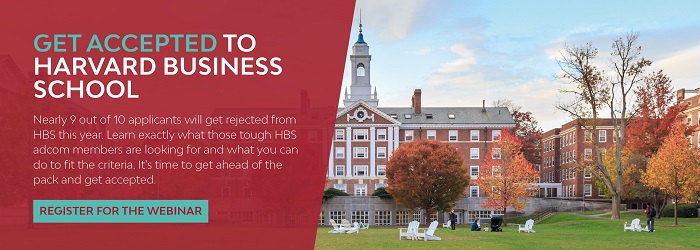Events & Promotions
|
|

GMAT Club Daily Prep
Thank you for using the timer - this advanced tool can estimate your performance and suggest more practice questions. We have subscribed you to Daily Prep Questions via email.
Customized
for You
Track
Your Progress
Practice
Pays
Not interested in getting valuable practice questions and articles delivered to your email? No problem, unsubscribe here.
- Nov 20
07:30 AM PST
-08:30 AM PST
Learn what truly sets the UC Riverside MBA apart and how it helps in your professional growth
Kudos
Bookmarks
Thank you, Harvard Business School. IMHO, that’s what applicants should think when they visit the program’s website and find “habit of leadership” on its “Who are we looking for?” admissions page.
It’s common knowledge that HBS values leadership, but with this phrase, the adcom succinctly expresses how they view leadership – dynamic, deep, intrinsic, long-term. It’s something you possess and bring to your experiences, not something that happens to describe your involvement in a few isolated incidents (i.e., the proverbial “leadership experience”). Not just HBS applicants, but all b-school applicants can benefit from reflecting on the phrase – and then determining how they embody it in their actions.
There are a gazillion excellent articles and treatises on the meaning of leadership. And most of them are valid. I’m focusing on the other word. The key to this message is habit. First, it’s active. It’s something done. It’s not something bestowed upon you (like the title Team Lead) and it’s not something ascended to (advanced to Project Manager). Whether good or bad, habits are something you do.
Second, a habit is reflexive, a part of you. You may think about it objectively in your mind, but it’s also behavior. Yet that doesn’t automatically mean it’s innate – a habit may be learned (you probably know someone who trained herself to become more patient or more decisive or less defensive). Therefore, if you aren’t a “born leader,” you can still develop the habit of leadership.
A habit knows no boundaries. You exercise the habit of leadership in school, in your family, with friends, at work, in your community. It means that when something needs doing or when you perceive an opportunity for positive impact, you shift into gear to make it happen – even if it’s hard, even if it’s not your designated role, even if you’re not sure exactly how you’ll do it. Simply, it’s what you do.
Because it’s action oriented, not title or ego oriented, the habit of leadership, ironically, may sometimes seem invisible, a hidden force. Routine and regular. Example: your friends, tired after a long day of canoeing on the Delaware River, squabble about where to go for dinner. You gently draw the group’s focus to the two most feasible options, proposed by two different members of the group; everyone starts to feel enthusiastic again. They may not consciously recognize your leadership; in fact, the person who proposed the “winning” idea might feel like the leader! (More irony: real leadership often allows others to feel like the top dog.) Of course, the opposite is also true sometimes: your leadership habit may require you to visibly assert an opposing vision or emphatically convince people to join you in taking a risk.
While this quality is something HBS explicitly seeks, any b-school adcom will value it – after all, someone with “leadership experience” isn’t necessarily a leader fundamentally, but someone with the “habit of leadership” is. All b-schools want leaders.
Having the habit of leadership is great, but it’s only helpful to the application if you express it effectively. That means – you’ve heard it from us ad infinitum – use example and anecdote. Look for opportunities to weave in the message of your habit of leadership, even in essays on other topics. Also, try to bring it out in your resume and your interviews. Ask your recommenders to highlight it. It can only enhance your application and your candidacy.
By Cindy Tokumitsu, author and co-author of numerous ebooks, articles, and special reports, including Why MBA and Best MBA Programs: A Guide to Selecting the Right One. Cindy has advised hundreds of successful applicants in her fifteen years with Accepted.
Related Resources:
• Harvard Business School 2016 MBA Essay Tips & Deadlines
• Life as an HBS MBA Student
• What Does Harvard Business School Want?
This article originally appeared on blog.accepted.com.
Applying to a top b-school? The talented folks at Accepted have helped hundreds of applicants get accepted to their dream programs. Whether you are figuring out where apply, writing your application essays, or prepping for your interviews, we are just a call (or click) away.
Contact us, and get matched up with the consultant who will help you get accepted!
Archived HBS Discussion
Hi there,
You've stumbled upon an old discussion from our HBS Forum
that's now outdated and has been archived. No more replies are possible here.
Interested in current discussions? Feel free to dive into our dedicated HBS Forum
for all fresh things related to the HBS MBA program.
Thank you for understanding, and happy exploring!
Kudos
Bookmarks
Very enlightening. Thank you for sharing this piece of wisdom!
DensetsuNo
Joined: 11 Oct 2015
Last visit: 05 Aug 2023
Posts: 90
Own Kudos:
Given Kudos: 38
Status:2 months to go
Schools: HBS 2+2 '22 MIT Sloan MSMS"18
GMAT 1: 730 Q49 V40

GPA: 3.8
Kudos
Bookmarks
Nice one, thanks Cindy. \(:)\)








